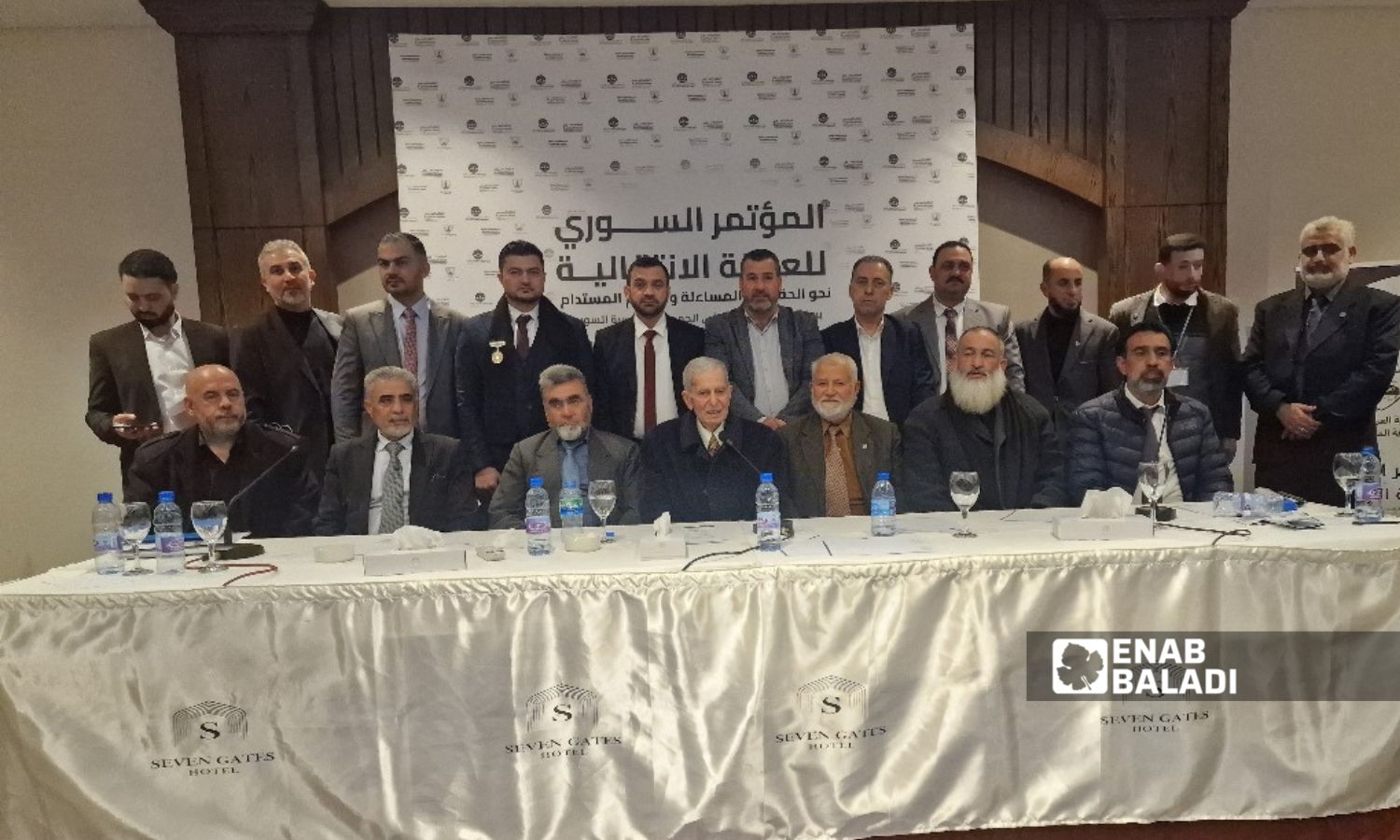



The Syrian Conference on Transitional Justice discussed mechanisms for achieving transitional justice aimed at building a state based on the rule of law and respect for human rights. It addressed different groups that should be subjected to justice, including those involved in military and security actions, as well as businessmen.
The conference was organized by the Free Syrian Lawyers Association, under the auspices of the Syrian Bar Association at the Seven Gates Hotel (formerly Sheraton) in Damascus, on Monday, February 17.
It was attended by representatives from civil society organizations, active governmental and civil entities, legal experts, and human rights activists.
During the conference, the representative of the Free Syrian Lawyers Association, Samer al-Dhayyi, stated that the goal of this conference is not only to discuss transitional justice but also to pose questions about Syria’s future and ways to politically, socially, and economically rebuild it.
He emphasized the need to inform the victims’ families that the process of accountability is a sequential one, meaning that not everyone who was part of the regime will be held accountable or face prosecution. There needs to be a distinction between the leaders who planned the crimes and the individuals who executed and contributed to these crimes, as well as ordinary individuals. Here, a psychological and social balancing act must be conducted between the issues of stability and accountability.
Al-Dhayyi proposed establishing an independent body that includes the families of victims and those who have faced violations, to monitor the process of transitional justice and accountability, to ensure that accountability does not turn into a vengeful act against a particular side, aiming for balance that prioritizes stability.
Transitional justice is crucial for resolving conflicts and achieving reconciliation in societies affected by conflicts. It is a means to rebuild trust between citizens and the state, and its success depends on the participation of civil society and citizens, according to al-Dhayyi.
During the conference, Zahra al-Barazi, director of programs at the Syrian Legal Development Program (SLDP), noted that transitional justice also includes human rights violations committed by businessmen against the Syrian people. The names of those who have played this role are well-known among the majority of the Syrian populace, and it is important to understand how they will be held accountable, as Syrian law is unclear regarding dealing with such violations.
The current Syrian government has issued orders to freeze the assets and bank accounts of companies and individuals linked to the previous regime, including names listed on US sanctions lists.
Yasser Farhan, director of the Mizan Organization for Studies and Human Rights, indicated that justice and peace are interrelated paths, and restitution must be made to the victims from both material and moral aspects. This requires immense international support.
He continued that the voices of victims’ families must be listened to, as they are a fundamental party, and their medical, psychological, and social needs should be addressed since these testimonies help document human rights violations.
Political analyst and researcher at the Jusoor For Studies Center, Wael Alwan, emphasized that transitional justice is part of this stage and is linked to many matters and procedures, protecting against chaos on one hand and providing justice for victims on the other.
Alwan stated to Enab Baladi that bringing together the perpetrator and the victim necessitates the existence of justice, as what threatens society and security is retaliatory vengeance. To properly close this chapter, accountability must be achieved, according to Alwan.
Maysaa Said, director of the Ishraqat Foundation (Syrian Women’s Forum), mentioned to Enab Baladi that the prolonged path of justice disturbs the families, and delays erode their trust in the process.
She added that achieving peace and reconciliation in communities affected by conflicts and violations requires more than merely holding perpetrators accountable for their actions; it necessitates comprehensive strategies that incorporate recognizing the suffering of victims, ensuring their rights, and providing necessary compensations.
The delay in implementing transitional justice in Syria raises fears regarding its impact on Syrians, especially the victims who suffered under the regime and are seeking justice to alleviate their suffering and restore part of their rights.
Transitional justice requires a timeframe to launch subsequent pathways, according to a report issued by the Syrian Dialogue Center on February 11.
To prevent the victims and their families in the Syrian context from experiencing widespread disappointments that discourage them from demanding justice, it is important to understand the relativity of the attainable achievements and encourage them to propose initiatives and creative ideas for dealing with the legacy of the past, according to the report.
if you think the article contain wrong information or you have additional details Send Correction